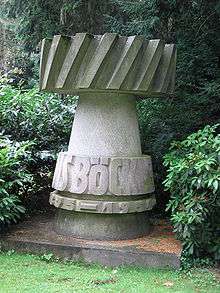Hans Böckler

Hans Böckler (26 February 1875 – 16 February 1951) was a German politician and union leader.
Biography
Böckler was born in Trautskirchen near Neustadt an der Aisch and grew up in a family with limited means. When his father died in 1888 he quit school and worked as an apprentice Goldbeater to support his family. In 1894 he joined the Sozialdemokratische Partei Deutschlands and the Deutscher Metallarbeiter Verband.
From 1914 to 1915 he fought in World War I. He was badly injured and relieved from military service. He worked for the unions in Danzig, Kattowitz und Siegen until the end the war.
From 1924 to 1926 he was Stadtverordneter of the SPD in Cologne. In 1928 he was elected to the Reichstag where he remained until 1933.

In 1945 he was instrumental in the reorganisation of the unions in the British Zone of Occupation. In April 1947 several unions joined to form the Gewerkschaftsbund in der britischen Besatzungszone and elected Böckler as the president.[1] In 1949 he became the first president of the Deutscher Gewerkschaftsbund (DGB).
On January 25, 1951 Böckler signed an agreement about the Co-determination with German Chancellor Konrad Adenauer.
He died of a heart attack in Düsseldorf. The Hans-Böckler-Stiftung is named after him.
Works
- 1906: Es werde Licht! In ernster Zeit - Ein ernstes Wort an die Hüttenleute und Metallarbeiter im Saargebiet - Verlag von J. Böckler, Saarbrücken
Literature
- Ulrich Borsdorf: Hans Böckler. Arbeit und Leben eines Gewerkschafters von 1875 bis 1945. Köln: Bund-Verlag, 1982. ISBN 3-7663-0497-6
- Joachim Heinz, Die Hunde des Herren führen ein schöneres Leben als Ihr, St. Ingbert 1992
- Hans Böckler, Ein Leben für die Gewerkschaft, Köln 1950
References
External links
- Hans Böckler in the German National Library catalogue
- Hans-Böckler-Stiftung
| ||||||
|